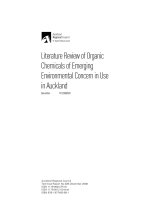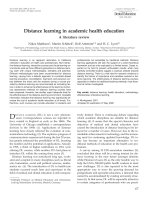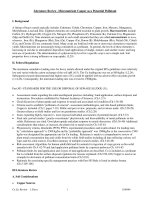literature review powerpoint
Bạn đang xem bản rút gọn của tài liệu. Xem và tải ngay bản đầy đủ của tài liệu tại đây (528.87 KB, 26 trang )
Major goals for this class:
1. Write a good literature review
related to a topic in your
National Board area
2. Prepare a literature-based
presentation the school board
1
The Importance of Working with
Literature
Working with literature is an essential part of the research process that:
generates ideas
helps form significant questions
is instrumental in the process of research design
O'Leary, Z. (2004) The Essential Guide to Doing Research. London: Sage
Chapter Six
2
Working with
with
Working
Literature
Literature
Find it!
it!
Find
Manage
Manage
it!
it!
Use it!
it!
Use
Review it!
it!
Review
Working with
with
Working
Literature
Literature
Find itit!!
Find
Manage it!
it!
Manage
Use it!
it!
Use
Review it!
it!
Review
Knowing the
the literature
literature types
types
Knowing
Using available
available resources
resources
Using
Honing your
your search
search skills
skills
Honing
Working with
with
Working
Literature
Literature
Find it!
it!
Find
Manage it!
it!
Manage
Use it!
it!
Use
Review it!
it!
Review
Reading efficiently
efficiently
Reading
Keeping track
track of
of references
references
Keeping
Writing relevant
relevant annotations
annotations
Writing
Working with
with
Working
Literature
Literature
Find it!
it!
Find
Manage it!
it!
Manage
Use it!
it!
Use
Review it!
it!
Review
Choosing your
your research
research topic
topic
Choosing
Developing your
your question
question
Developing
Arguing your
your rationale
rationale
Arguing
Informing your
your work
work with
with theory
theory
Informing
Designing method
method
Designing
Working with
with
Working
Literature
Literature
Find it!
it!
Find
Manage it!
it!
Manage
Use it!
it!
Use
Review it!
it!
Review
Understanding lit
lit review’s
review’s purpose
purpose
Understanding
Ensuring adequate
adequate coverage
coverage
Ensuring
Writing purposefully
purposefully
Writing
Working on
on style
style and
and tone
tone
Working
Working with
with
Working
Literature
Literature
Find it!
it!
Find
Manage it!
it!
Manage
Use it!
it!
Use
Review it!
it!
Review
Knowingthe
the
Knowing
literaturetypes
types
literature
Reading
Reading
efficiently
efficiently
Choosingyour
your
Choosing
researchtopic
topic
research
Understanding
Understanding
litreview’s
review’s
lit
purpose
purpose
Usingavailable
available
Using
resources
resources
Keepingtrack
track
Keeping
ofreferences
references
of
Developingyour
your
Developing
question
question
Ensuring
Ensuring
adequate
adequate
coverage
coverage
Honingyour
your
Honing
searchskills
skills
search
Writingrelevant
relevant
Writing
annotations
annotations
Arguingyour
your
Arguing
rationale
rationale
Writing
Writing
purposefully
purposefully
Informingyour
your
Informing
workwith
withtheory
theory
work
Workingon
on
Working
styleand
andtone
tone
style
Designing
Designing
method
method
Finding literature
Finding relevant literature can be made easier if
you are able to readily access and draw on a
wide variety of resources such as:
reference materials
books
journals
official publications
Archives
Adapted from O'Leary, Z. (2004)
The Essential Guide to Doing Research. London: Sage Chapter Six
9
Finding literature
Don’t go it alone!!
When looking for literature be sure to call on the experts such as:
librarians
supervisors
other researchers
practitioners
O'Leary, Z. (2004) The Essential Guide to Doing Research. London: Sage
Chapter Six
10
Managing the literature
It also pays to be organized and diligent when it
comes to keeping references.
Keep and file copies of relevant books, articles, etc.
Avoid lending out your ‘only copies’
Use APA style from the start
Consider using bibliographic file management
software such as Endnote or WORD 2007
Adapted from O'Leary, Z. (2004)
The Essential Guide to Doing Research. London: Sage Chapter Six
11
Annotating Sources
Annotating your sources (as you did in EDTE 250
with Susan) provides you with a record of relevant
literature. It should include:
the citation
articulation of the author and audience
a short summary
critical commentary
notes on relevance that remind you of the significance,
accuracy, and quality of the sources cited
O'Leary, Z. (2004) The Essential Guide to Doing Research. London: Sage
Chapter Six
12
The Formal Literature Review
Most find the writing of a literature
review a challenging task that takes
patience, practice, drafts, and
redrafts
O'Leary, Z. (2004) The Essential Guide to Doing Research. London: Sage
Chapter Six
13
What does this have to do with
getting your National Board
Certification?
As a National Board
certified teacher you are
an expert in your field . . .
O'Leary, Z. (2004) The Essential Guide to Doing Research. London: Sage
Chapter Six
14
The Formal Literature Review
The formal literature review established your credibility as an expert in your field and:
informs your readers of your topic
argues the need for, and relevance of, your work
Adapted from O'Leary, Z. (2004) The Essential Guide to Doing Research. London:
Sage
Chapter Six
15
16
Writing your Literature Review
A good literature review is an argument that is more purposeful than a simple review of relevant literature
O'Leary, Z. (2004) The Essential Guide to Doing Research. London: Sage
Chapter Six
17
Writing your Literature Review
Writing a good review requires you to:
read a few good reviews
write critical annotations
develop a structure
write purposefully
use the literature to back up your arguments
review and write throughout the research process
get feedback
and be prepared to redraft
O'Leary, Z. (2004) The Essential Guide to Doing Research. London: Sage
Chapter Six
18
Writing your Literature Review
Style and Tone…
Writing a good literature review can be
likened to holding a good dinner party
conversation
They both require individuals who can
engage, learn, debate, argue, contribute, and
evolve their own ideas, without being
hypercritical or sycophantic
O'Leary, Z. (2004) The Essential Guide to Doing Research. London: Sage
Chapter Six
19
Class Texts:
Writing Literature Reviews by Jose L. Galvan
Publication Manual of the American Psychological Association. (5th ed.) (2001)
20
Writing Literature Reviews
As you read the first three
chapters, here are some things to
pay particular attention to . . .
21
For next week:
Read Why Teachers Must Become
Change Agents” article
Chapters 1 to 3 & Model Lit
Review(p119) of Lit Review Text, then
answer Activity #2 questions
Complete “Term Paper Familiarization
Test”
22
Chapter 1
Primary Sources – what are they and why these instead of secondary sources
What are the 3 major issues of empirical studies?
The Writing Process: What makes it different than other writing you have done and how do the chapters of this book support
the process?
23
Chapter 2
What’s the difference between writing a literature review for a term paper and writing for a thesis?
What are the two main goals for a thesis literature review?
How will you adapt this to your NB topic?
24
Chapter 3
What are the steps to selecting a topic and identifying literature for review?
Good, now organize your Literature Review utilizing these steps!
25









